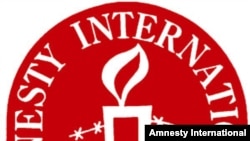Amnesty International warned Wednesday that Zimbabwe could face a new wave of political violence in light of recent attacks on independent monitors activists by alleged supporters of President Robert Mugabe's ZANU-PF party during the constitutional revision public outreach process launched last week amid disorganization.
Three independent monitors were detained and beaten with logs by ZANU-PF supporters on Sunday in the most serious incident reported to date, sources said. ZANU-PF militants took three monitors - Paul Nechishanu, Artwel Katandika and Shingairayi Garira – to a farm in Makonde district, Mashonaland West province , and beat them with thick branches. Garira sustained injuries to an eardrum; Nechishanu and Katandika suffered head injuries.
Amnesty International Africa Director Erwin Van Der Borght said in the report that intimidation and harassment of activists undermines the country’s efforts to draft a new constitution with popular input and is “a worrying reminder of the organized violence” seen during the 2008 presidential and general elections.
Amnesty Zimbabwe researcher Simeon Mawanza told VOA reporter Blessing Zulu that the practice of intimidating or committing violence against people to silence them is a major concern.
Last Thursday police in Mutare, the capital of eastern Manicaland province, arrested civil society monitors Godfrey Nyarota and Tapiwa Mavherevhedze, and their driver, Cornelius Chengu, for allegedly practicing journalism without a license, at the instigation of a local ZANU-PF activist and war veteran, sources said.
Another Mutare activist, Endy Ziyera, was held for several hours and released without charge Friday after bringing food to Nyarota, Mavherevhedze and Chengu in custody.
Also Friday, three members of the Movement for Democratic Change formation of Prime Minister Morgan Tsvangirai were detained by unidentified state agents in Marondera, Mashonaland East province. They later turned up at the Marondera police station. MDC sources said the activists as yet faced no formal charges.
The MDC said Wednesday that teacher Philani Dube of Bubi District, Matebeleland North province, was harassed by war veterans and ZANU-PF militants in the area for holding discussions on the constitution at his home.
Elsewhere, MDC breakaway faction leader Job Sikhala called on the international community to stop funding the constitutional outreach program, saying that such resources were being used to trample on citizens' rights. He also challenged the National Constitutional Assembly, which opposes the country's parliamentary-led constitutional revision process, to demonstrate its commitment to the position and actively oppose the process.
Political sources said the parliamentary select committee running the constitutional revision process met in Harare on Wednesday and instead of firing national outreach coordinator Peter Kunjeku, as sources told VOA Tuesday had been decided by the committee, would instead reduce his responsibilities in the program.
Sources said Kunjeku would be relieved of his duties at the meeting Wednesday for poor management of the process, but Select Committee Co-Chairman Edward Mkhosi dismissed the reports. He told VOA Studio 7 reporter Jonga Kandemiiri the meeting was called to review progress and solve outreach problems.
The constitutional revision management committee which includes Cabinet members as well as members of the parliamentary panel, met Tuesday. Select Committee Co-Chairman Douglas Mwonzora said the meeting acknowledged the many hiccups that have beset the outreach process since its launch last week.
Critics of the process continue to point out that the question of presidential term limits has not been included in the talking points distributed to outreach teams to guide public discussions.
Themba Dlodlo, a lecturer at the National University of Science and Technology in Bulawayo, who helped draft the talking points, said he was shocked that the issue is not being formally addressed in the consultations.
The Zimbabwe Human Rights Association said the outreach program continues to be marred by intimidation and confusion. ZimRights Director Okay Machisa said that Mashonaland provinces where political violence has often occurred are reporting cases of intimidation, and the committee is not publicizing meetings properly.
Mashonaland East residents complained that meetings are being monitored by state agents and policemen in civilian clothing. United Residents Association Secretary General Masimba Ruzvidzo told VOA Studio 7 reporter Patience Rusere that this has made some people fearful, resulting in low meeting turnouts.
From Gweru, United Residents Association Secretary General Benny Munetsi complained that outreach meetings are being led by politicians rather than by outreach team members.





